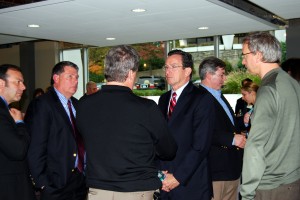
Asked what was the single most intriguing or radical idea he has heard in the past four months canvassing business groups on how to spur growth, Gov. Dannel P. Malloy gave pause in Stamford recently.
“I think the most important thing to the state”™s stability over the long haul ”¦ is access to capital and playing around with the idea of matching capital, using vehicles other than (Connecticut Innovations) for investing,” Malloy said. “Perhaps co-investing with private investors (and) an incentive being made to invest in Connecticut startups or young companies.”
Malloy addressed a gathering of the CEO Roundtable at High Ridge Park Corporate Center in Stamford, in between unveiling plans for a “Startup Connecticut” initiative and a larger jobs proposal for the state. Capping a months-long tour that took him to more than 70 companies and business groups, Malloy suggested he will focus on a few areas to rekindle economic growth in Connecticut: capital for small businesses, particularly startups in high-growth industries like life-sciences; precision manufacturing; more incentives for hiring; and lightening regulation on companies that do business here.
At the Stamford roundtable, Malloy stressed the need to get funding to help young, promising companies secure the financing and other assistance needed to get them to the point where they can ramp up hiring.
“It”™s really skill-set match and early investment in critical stages,” Malloy said. “You get angels and you have a product that”™s viable, you probably get second-stage or late angel, but then they need a breakthrough after the proofing stage. It”™s clearly very tough, and unless the banks start opening more, or unless other investment opportunities (materialize), that is going to be a tough one for us.”
At deadline, Malloy had yet to issue his plan, which the Connecticut General Assembly is scheduled to debate beginning the week of Oct. 24. Businesses remain wary ”“ a poll published last week by the Connecticut Business and Industry Association and the Stamford Chamber of Commerce cited the state”™s high cost of doing business as the single biggest factor discouraging expansion, followed by regulatory red tape.
“We”™re not looking for money,” said David Lewis, co-founder of the CEO Roundtable and CEO of Stamford-based OperationsInc. “What we”™re hoping to get out of this jobs session is something that will help all of us ”¦ to incent us, to incent our clients and our prospective clients to hire ”¦ Tax incentives, tax breaks ”“ something that is small-business oriented, not for the top five employers.”
Malloy said he would also create an “understandable” portal through his website to steer companies to all the services the state has to offer businesses contemplating an expansion here. And he suggested universities can play a bigger role in helping spawn new companies.
“We”™ve got to do a better job in Connecticut ”¦ of getting more ideas in our state monetized. I think the other part of that, then, is changing the culture educationally in our institutions of higher education,” Malloy said. “I think we”™re in the process of doing that, but the difference between MIT and Yale is pretty significant. MIT started as a land-grant university. They always saw a public mission, outside of teaching the liberal arts, and Yale has been slowly doing that ”¦ Getting our institutions of higher education to work in a more cooperative fashion towards the monetization or the development of products ”¦ would be the other big idea we”™ve got to bring to fruition.”



















